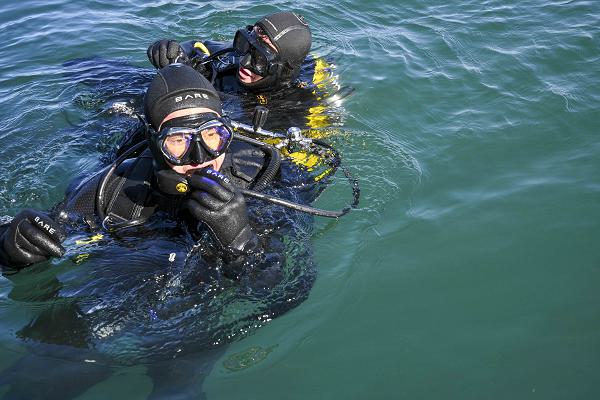
Port Hueneme, California. (January 31, 2025): What sets Navy divers apart is that they are continuously surrounded by that which can kill them. Unlike surface warriors, Navy divers can die if they make even one mistake deep beneath the waves. In this photo by Lisa Ferdinando, Navy Lieutenant Commander Igor Vladimirov and Petty Officer 2nd Class Cody Kramer receive emergency scuba training at the Naval Facilities Engineering and Expeditionary Warfare Center here. The Center trains divers how to respond to underwater emergencies including rescuing lost, trapped, or unconscious divers and how to treat a variety of dive-related illnesses.
During the arduous training, divers are confronted with real-world scenarios and evaluated on their ability to respond appropriately. Students are challenged to locate lost or trapped divers and how to safely rescue someone who is unconscious. Students learn how to use emergency oxygen to treat scuba diving injuries, assess neurological damage, and the proper first aid to apply.
The most common dive-related illness is the “Bends,” also known as decompression sickness, a potentially fatal condition. The Bends occur when bubbles of dissolved gas build up in the bloodstream that burst if the diver ascends too quickly. At the surface human body pressure is equalized, but once submerged nitrogen gas accumulates in the bloodstream. To safely return to the surface, a diver must rise slowly and gradually to allow the deadly nitrogen bubbles to dissipate. Symptoms of the disease include chest pain, difficulty breathing, dizziness, and paralysis. The primary treatment for the Bends involves placing the patient in a hyperbaric chamber breathing pure oxygen.
Other dive related illnesses include Barotrauma which occurs when a diver’s body tissues are damaged due to sudden pressure differences, especially in the ears, sinuses, and lungs. Divers may also suffer from Gas Toxicity which happens when a diver inhales too much oxygen, nitrogen, or carbon dioxide causing symptoms like nausea, vomiting, dizziness, and confusion. As if that is not enough, divers risk drowning and exposure to hazardous marine life.
Unlike their land lubber comrades, Navy divers thrive in an environment in which everything is trying to kill them.


